
Chloe Bailey in tears after accidentally eating beef burger for the first time in 10 years
Chloe Bailey was left in distress after she recently accidentally ate a beef burger, interrupting 10 years of dedicated veganism. The Little Mermaid star, 25, and her younger sister Halle Bailey, 23, have both been vegans for the last decade and have been outspoken about their dietary choices. However, Chloe revealed in an Instagram Live stream that she was mistakenly served red meat instead of a plant-based Beyond Meat burger over the weekend, just before attending Beyoncé’s Renaissance World Tour concert in Atlanta, Georgia. According to Chloe, the incident occurred on Saturday (12 August) after she ordered burgers for her and Halle in the hotel they were staying in before the show. She told fans: “So I called to get a Beyond Burger for sis and I like usual. Specified that it’s vegan, no butter on the bun, nothing like that. “So we get the burgers, I’m getting out of the shower… and she’s eating the burger and she’s like, ‘Are you sure this is Beyond?’” Confident in her ordering, Chloe said it was. However, when she took a bite of the burger herself, she realised something was wrong. The “Do It” singer continued: “I touched the patty and smelled it and was like, ‘Of course it’s Beyond, yeah’. So I finish getting dressed, I take a bite and the juice dripping from the burger is not like a Beyond burger. I just knew it was not a fake burger. “The one bite I took and I just knew. Immediately I said, ‘This doesn’t feel right’.” She quickly rang the hotel’s front desk to ask if they delivered vegan burgers to her hotel room. However, the concierge’s answer horrified her. “He said, ‘No, they’re brand burgers’. I said, ‘Brand burgers? I said Beyond burgers’. I don’t even know what a brand burger is,” she told fans on the livestream. “Immediately I’m losing my s***. I gobbled down a whole can of Sprite. Halle’s laughing at me because I’m crying. This is right before the concert yesterday. I’m crying, Halle’s just laughing so hard at me because I’m freaking out. “I’ve been vegan for 10 years. I have not consumed any red meat for 10 years,” Chloe added. The clip was shared on the celebrity news Instagram account The Shade Room, and prompted sympathy from other vegetarian and vegan fans. “I’m vegetarian and it’s definitely hard to tell the difference sometimes but you know the taste of real meat and that stomach ache ain’t no joke,” one person commented. Another said: “My first time eating meat after a full vegan diet, my stomach… revolted.” Halle said in a 2017 interview with Complex that the sisters went vegan because of their mother. She explained: “One day, she was like, ‘I’m gonna try to be vegetarian for a week. You can join me if you’d like’. We started the week with her and just never went back.” In an awkward red carpet exchange at the premiere of live-action remake of The Little Mermaid, Halle was asked who she would choose to eat between Flounder and Sebastian. In the film, Flounder is a fish and Sebastian is a crab. She responded: “I would not eat either of them. They’re my friends." Read More The millionaire smuggled out of Japan in a box: Was Nissan boss Carlos Ghosn a victim or a villain? Husband ‘ruins’ dinner because of his wife’s typo: ‘The worst kind of control freak’ Billy Porter hits out at Harry Styles and Anna Wintour over Vogue cover: ‘You’re using my community’ How sizzling kitchen drama The Bear is spicing up the dating game for chefs Mick Fleetwood says his Hawaii restaurant was ‘lost’ in devastating Maui wildfires Where to find the best Guinness in London – and how to spot a bad one
1970-01-01 08:00
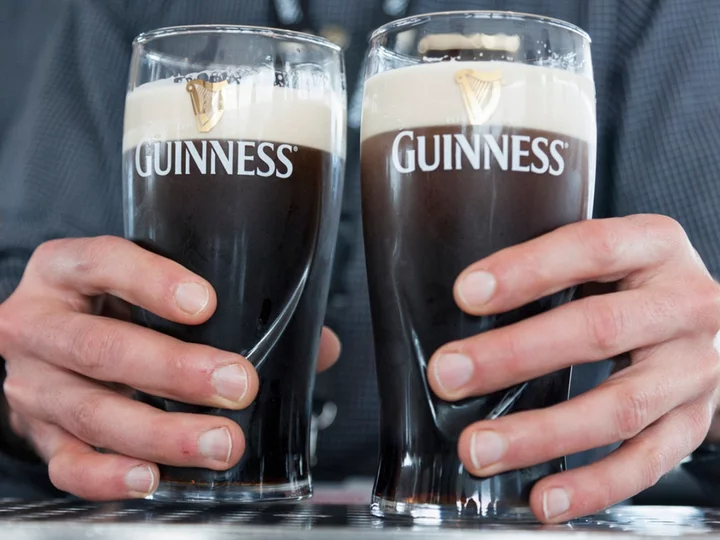
Where to find the best Guinness in London – and how to spot a bad one
Finding a decent pint of Guinness in London can all too often be a disappointing quest, from sour or bitter to poorly poured pints in plastic cups with bubbly heads. Some even say London is where Guinness goes to die. For those who feel they should at least enjoy drinking the pint they’ve paid ludicrous prices for, here’s a small, non-exhaustive and open-ended list of London pubs where you’re more or less guaranteed a scrumptious pint of what my friends and I call Guinny Jones. I’d like to add a disclaimer that I’m not an expert – though I am a quarter Irish and have taken the Guinness factory tour in Dublin – I just really, really like a good pint. So, I spoke to Ian Ryan, who runs an Instagram account dedicated to the capital’s crimes against the black stuff (@shitlondonguinness) and though he isn’t exactly short on blasphemous submissions, he’s also got a lot of insight into what makes a good pint and where to find it. Plus, Ian has a book coming out in October, A Beautiful Pint: One man’s search for the perfect pint of Guinness - he cares about the cause. Before we get to the pubs, here’s what we’re looking for in a pint. Texture: it should have a texture that withstands the “tilt test”, if you tip your glass slightly to the side and the head starts dripping down the side, it’s too watery. It should rise just above the edge of the glass in an oh-so-satisfying manner. Taste: Guinness has a malty sweetness and bitter hoppines, but it shouldn’t be too bitter, nor should it be sour. It should be rich and creamy, with slight aromas of coffee. If it tastes metallic, run for the hills. Head: a good pint of Guinness needs that signature creamy head. Ideally, it’ll be domed and around three-quarters of an inch. This is essential for balance and flavour. Also, if the head is littered with bubbles, it means it hasn’t been properly aerated and will almost definitely taste bad. Pour: according to Guinness Storehouse it should, of course, be in a Guinness or milk stout glass – it’s just wrong drinking out of a Stella or Beavertown. It should then be poured at a 45-degree angle up to the harp and then left to settle for at least a minute, but up to two if possible. It’s finished by topping up with the glass held straight. Red flags: according to Ryan, any sort of bubbles in the head are a big no-no. “Also, if you walk into a pub and no one is drinking Guinness, it could be a sign of bad things to come…” The Auld Shillelagh, 105 Stoke Newington Church Street, London, N16 0UD This Irish pub is most die-hard Guinness fan’s favourite London establishment, Ryan included. It looks tiny and unassuming from the outside but its narrow interior stretches far back into a surprisingly spacious garden. They have live music, great craic and, of course, perfect pints of Guinness. The best thing about the Shillay is that it doesn’t try too hard, which means it ends up absolutely nailing the pub formula. The Irish Times even named it the “most authentic Irish pub in the world outside Ireland”. If that doesn’t convince you, I don’t know what will. The Globe, 20 Morning Lane, London, E9 6NA A pub where you can enjoy Spoons prices without Spoons guilt, The Globe is a local’s pub through and through, but they’re also incredibly welcoming to newcomers. They’ve got live sports, pool, darts, karaoke, live music and pints of Guinness that pass the test at around the £4 mark, for zone 2, that’s practically unheard of. The Coach and Horses, 42 Wellington Street, London, WC2E 7BD Not far from Covent Garden piazza, The Coach and Horses is just far enough off the beaten track to not be inundated as most pubs in central are. This one-room Irish pub was once voted as the best Guinness in Britain by The Irish Post, plus they also sell hot roast beef sandwiches. Gibney’s London, 70 City Road, London, EC1Y 2BJ Staying open until 2am on a Friday, Gibney’s is an Irish pub based in the heart of Shoreditch. Upstairs they have “inventive small plates, Irish meats cooked over the open flame, fresh seafood and more from chef Richard Corrigan”, while downstairs they have Shit London Guinness-approved pints. The Cock Tavern, 23 Phoenix Road, London, NW1 1HB An unpretentious pub that prides itself on not being trendy, The Cock Tavern is a delight for both locals and tourists due to its proximity to Euston. Described by one reviewer as an “oasis of humour, personality and character” in the big city and endorsed by SLG, this rough-and-ready establishment knows how to pour a pint and provide good times. The Sheephaven Bay, 2 Mornington Street, London, NW1 7QD An “Irish bar with a conservatory, beer garden and no less than seven plasma screens for showing sports”, The Sheephaven Bay is easily the best Guinness in Camden. Lively atmosphere and friendly staff, what’s not to like? The Kenton Pub, 38 Kenton Road, London, E9 5BA Most of the pubs listed have unsurprisingly been of the Irish variety, so to throw a curve ball into the mix is the Kenton, a Norwegian pub in Hackney. There’s loads of cosy nooks and crannies, occasional DJs on a Saturday and the fantastic staff all pride themselves on pouring a proper pint. I asked general manager Morgan Ryan about what the secret to serving great Guinness is: “There’s not really a trick to it if you’ve ever poured a pint. Don’t buy old kegs, don’t store them badly and don’t have dirty ass lines.” Read More Marina O’Loughlin is wrong – there’s joy in solo dining Budget Bites: Three recipes to keep food bills down before pay day Meal plan: Romesco chicken and other recipes to fall in love with The chef who hated food as a child Who knew a simple flan could be so well-travelled? Midweek comfort food: Singaporean curry sauce and rice
1970-01-01 08:00

Mick Fleetwood says his Hawaii restaurant was ‘lost’ in devastating Maui wildfires
Mick Fleetwood has confirmed that his restaurant in Hawaii has been burnt down by the ongoing deadly wildfires in Maui. The Fleetwood Mac co-founder, 76, wrote in a post on X, the social media platform formerly known as Twitter, that Fleetwood’s on Front Street “has been lost” as the fires rip through the historic town of Lahaina on the island. At least 55 people have died in the disaster, alongside more than 1,700 buildings and billions of dollars in property that have been destroyed. More than 14,000 people have been evacuated from Maui as of Wednesday. In his post, Fleetwood wrote: “Maui and the Lahaina community have been my home for several decades. This is a devastating moment for Maui, and many are suffering unimaginable loss. “Fleetwood’s on Front Street has been lost and while we are heartbroken, our main priority is the safety of our dear staff and team members. On behalf of myself and my family, I share my heartfelt thoughts and prayers for the people of Maui. “We are committed to supporting the community and those affected by this disaster in the days and months and years to come,” he added. Fleetwood opened his fine dining restaurant in 2012, featuring live entertainment and a rooftop area for customers to enjoy. The restaurant’s official Instagram account also shared a post, which read: “We do not have enough information at this time regarding Fleetwood’s on Front Street or any of our neighbours to share. Mahalo for your continued thoughts and prayers for our ohana, community and our first responders.” The wildfires began on Tuesday and have worsened throughout the week as a faraway hurricane fanned the flames, causing them to spread quickly. Governor Josh Green of Hawaii told a news conference on Thursday (10 August): “The full extent of the destruction of Lahaina will shock you. It does appear that a bomb went off.” US president Joe Biden issued a major disaster declaration and has ordered Federal aid to help local recovery efforts in the affected areas. He added in a White House statement: “Jill and I send our deepest condolences to the families of those who lost loved ones in the wildfires in Maui, and our prayers are with those who have seen their homes, businesses and communities destroyed. “We are grateful to the brave firefighters and first responders who continue to run toward danger, putting themselves in harm’s way to save lives.” A number of celebrities have also sent the people of Maui their well-wishes and have shared ways fans can help. Jason Momoa, who is Hawaiian, shared a post on Instagram to inform fans where they can donate to help with rescue efforts. He wrote: “We are devastated and heartbroken for our friends and ohana on Maui who [have] been impacted by the recent wildfires.” Bette Midler tweeted this week: “The beautiful island of Maui, in the most beautiful state in the union, is suffering. My family and I send our deepest and most profound sympathies to everyone who has lost anything or everything in the Maui fires.” Former US president Barack Obama has also spoken out and said in an Instagram Story: “It’s tough to see some of the images coming out of Hawaii – a place that’s special to so many of us. Michelle and I are thinking of everyone who has lost a loved one, or whose life has been turned upside down.” Read More Maui fires – live: Wildfires death toll climbs to 55 with 1,000 people still missing on Hawaii island ‘Heartbroken’ Aquaman star Jason Momoa reacts to ‘apocalyptic’ Maui wildfires Woman says her life was ‘blown up’ by viral plane rant where she called passenger ‘not real’ How to save money on your summer barbecue as prices soar Madeira: an unparalleled gastro heaven Europeans slam American for saying it’s ‘weird how’ French people butter sandwiches
1970-01-01 08:00
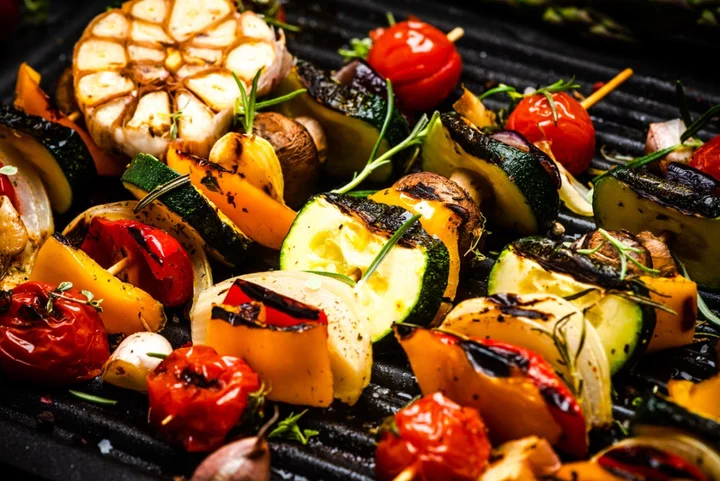
How to save money on your summer barbecue – as prices jump up from last year
Rising living costs are having a wide-ranging impact on our everyday lives, including when it comes to summer barbecues. In fact, the cost of food and drink for a typical summer barbecue in the UK could be around £10 more than last year, according to new calculations by Canada Life. The financial services provider, which used Office for National Statistics (ONS) figures to make the calculations, has put the cost of a typical barbecue at around £90, up from around £80 last summer. Of course, the actual cost will vary depending on exactly what you buy and how many people you’re catering for. In its basket of barbecue goods, Canada Life piled in products such as beef burgers, pork sausages, baking potatoes, chicken, meat-free sausages, veggie burgers, bread rolls, mayonnaise, cheese, salad ingredients, crisps, fizzy drink and alcoholic beverages. How can you keep barbecue costs down? If you’re keen to make the most of summer barbecue opportunities, but conscious of your budget too, Canada Life also has some tips. Spokesperson Shelley Greenwood suggests: “If you’re hosting more than once this summer, don’t throw out the charcoal after one use. Make sure you put out the fire safely and keep what is left in the barbecue for next time. Simply top up with new charcoal as needed.” Greenwood also suggests using price comparison apps such as Trolley to compare prices of items on your shopping list. “Then place your order through a cashback site to save even more,” she adds. She also suggests checking out apps for food in your local area that is being sold cheaply or perhaps even given away. For example, the Too Good to Go app allows people to search for bags of food being sold cheaply at places such as grocery stores, restaurants and cafes that might otherwise be destined to go to waste. Food sharing app Olio also helps stop surplus food going to waste, with users posting pictures of giveaways, including food and other items. Greenwood also suggests looking out for “yellow sticker” food items, which have been marked down in the supermarket, like cuts of meat or fish. Check these can be frozen and, if so, freeze them the same day and “simply defrost according to instructions ahead of your barbecue”, adds Greenwood. Also, rather than buying side dishes, go through your cupboards and fridge to see what ingredients could be transformed. Perhaps you could make your own pasta salad, or roast some tomatoes while you’re cooking something else, to create side dishes. You could also ask party guests to bring along a few sides to help share the costs. And if your priorities are more about having a summer gathering than firing up a barbecue, you could also consider by-passing the barbecue altogether and preparing food in your air fryer or slow cooker instead. Greenwood adds: “This way, you’re not reliant on the weather either.” Read More What I lost (and gained) by walking 10,000 steps each day for 5 months Woman says her life was ‘blown up’ by viral plane rant where she called passenger ‘not real’ How to save money in the kitchen according to top chefs Charity boss speaks out over ‘traumatic’ encounter with royal aide Ukraine war’s heaviest fight rages in east - follow live
1970-01-01 08:00

Europeans slam American woman in Paris for saying it’s ‘weird’ how French people butter sandwiches
One American woman living in Paris left a bad taste in the mouths of her European followers when she said it was “weird” how French people butter their sandwiches. In a 5 August TikTok post, Amanda Rollins dished out the hot take while she prepared her and her boyfriend’s lunch for the following day. The lifestyle blogger took two half baguettes and cut them face open. As she began to prep the bread with pats of butter on her knife, she admitted that some one of her fellow American followers may find what she’s doing “strange.” “It occurred to me that French people do something very weird with sandwiches that I think you guys would find strange. This is butter,” Rollins said. “What they do, it’s like a classic sandwich. It’s ham, cheese, and butter.” She went on to explain how mustard and mayonnaise – two known sandwich spreads – are replaced with the salty dairy product that has a high concentration of fat. In her opinion, mayonnaise is “basically fat as well,” and the creamy sauce is more flavorful. Because of this, Rollins assumed people would think the butter replacement was “gross,” but she encouraged them to try it anyway. “I know you might be thinking that sounds gross, but it’s actually so good. Is it healthy? No, of course not,” the TikTok user remarked. “What do you think of that? It’s kind of crazy.” “Don’t knock it until you try it,” she continued. European app users couldn’t believe how taken aback Rollins was by the act of spreading butter on a sandwich. As odd as Rollins made the food choice seem, they found it even more unusual that Americans don’t follow the same recipe “Who doesn’t use butter in their sandwich?” a baffled individual wrote, while another added: “How is that crazy? It’s the most simple basic sandwich.” One woman assumed: “Honestly, I think it’s only the US that don’t put butter on their sandwiches.” @americanfille Beurre it up baby ?? #frenchculture #frenchpeople #jambonbeurre #parisien ♬ original sound - Amanda Rollins “Butter before anything,” a TikToker from England exclaimed. “Swede here, and totally normal in Scandinavia as well,” another user added. One Canadian person claimed it was typical in their area as well. “Always butter in a sandwich. No mayo ever,” they commented. Speaking with Insider, Rollins admitted she was not expecting so many people from outside the US to think using mayo in lieu of butter was irregular. “A lot of people were saying mayonnaise on a sandwich is weird — to which I GASPED. In the US we are big condiment people,” she remarked. Currently living in Paris, Rollins added how obviously barren the grocery store condiment sections were compared to the ones in America. She was confident that people in the US who put butter on their sandwich bread were in the “minority” because butter is more of a “toast lubricator.” “We don’t view BUTTER as a CONDIMENT, it’s like a cooking ingredient and sometimes a toast lubricator. Like slabbing cold butter onto a sandwich would feel weird in the US, I know I am not making this up,” she told The Independent. “People in the comments are GOING OFF on the fact that Americans are the only ones who don’t do this regularly. There’s someone from each country in Europe chiming in and saying ‘we do that in England, we do that in Germany, we do that in. Sweden, etc’ and I have comments like ‘this is the most normal thing in the world,’ ‘americans are the only ones who find this weird’ - to which I keep replying: ‘...and who do you think my audience is?’” she continued. Rollins’ butter on sandwiches aversion extends to all recipes except the ham and cheese combo. Otherwise, the Paris resident prefers to stick with saucy condiments like she’s always done in the States. Read More How to save money in the kitchen according to top chefs Taco vendor attacked and pepper sprayed by woman who ‘refused to pay for food’ How to pimp up your instant ramen (and save money) McDonald’s worker goes viral after revealing how the brand’s sweet tea is made Michelin-starred chef Michael O’Hare puts Skittle twist on classic desserts How to make Thai favourite lemongrass chicken stir-fry
1970-01-01 08:00
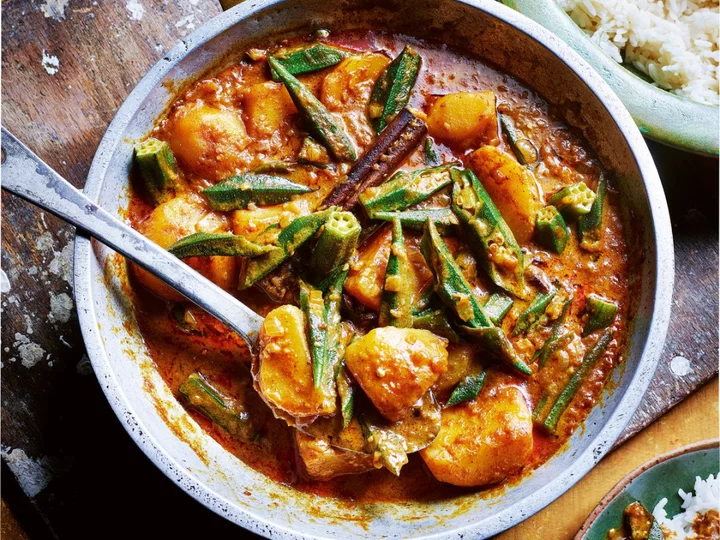
Midweek comfort food: Singaporean curry sauce and rice
There’s a meal in Singapore called ‘scissors-cut rice’, a selection of dishes piled high over a plate of lovely fluffy rice and topped with curry sauce,” says chef Jeremy Pang. “Originating from Hainanese Chinese descendants, the dish can be seen as a cross between a Malaysian nasi lemak and a Japanese katsu curry.” Curry sauce and rice Serves: 2 Ingredients: 2 cups of jasmine rice 2 cups of water 1 onion, finely diced ½ thumb-sized piece of ginger, peeled and finely chopped 2 garlic cloves, finely chopped 3 green chillies, pierced with the tip of your knife 1 potato, peeled and cut into 5cm chunks 300ml chicken stock 200g okra (swapsies: green beans), cut into 3-4cm lengths Vegetable oil For the sauce: 150ml coconut milk 1 tbsp sambal (swapsies: chilli bean sauce/toban jiang) 1 tbsp light soy sauce ½ tsp salt For the spices: 2 star anise 1 cinnamon stick 1½ tbsp curry powder Method: 1. Wash the rice at least three times. Place in a bowl and run under cold water, gently moving the rice grains between the tips of your fingers. Pour the rice through a sieve in between each wash, until the water runs clear. Sieve one last time and set aside. 2. Mix the sauce ingredients together in a jug. 3. Build your wok clock: start at 12 o’clock with the rice, followed by the onion, ginger and garlic, the spices, green chillies, potato, the sauce, chicken stock and lastly the okra. 4. Place the rice in a saucepan with the measured water. Cover with a tight-fitting lid, place on a medium-high heat and bring to a vigorous boil. Then reduce the heat to low and simmer with the lid on for 12-15 minutes until the liquid has evaporated to the point where you start to see air pockets form in between some of the rice grains. Replace the lid, turn the heat off and leave the rice to sit for another 15 minutes or so until ready to serve. 5. Once the rice is cooking, heat one to two tablespoons of vegetable oil in a saucepan to a medium heat, add the onion and fry for two to three minutes. Add the ginger and garlic and fry for a minute or so. Then add all the spices together, the green chillies and potato in turn, frying for about a minute after each addition. Pour in a quarter of the sauce and bring to a vigorous boil. Add another quarter of the sauce and again bring to a boil, then repeat this process until all the sauce has been added. Bring to a boil once again, pour in the chicken stock and cook on a medium heat for 20 minutes. Then add the okra and cook for five to 10 minutes before serving with the rice. ‘Jeremy Pang’s School Of Wok: Simple Family Feasts’ (Hamlyn, £22). Read More Marina O’Loughlin is wrong – there’s joy in solo dining Budget Bites: Three recipes to keep food bills down before pay day Meal plan: Romesco chicken and other recipes to fall in love with The chef who hated food as a child Who knew a simple flan could be so well-travelled? How to make Thai favourite lemongrass chicken stir-fry
1970-01-01 08:00

The chef who hated food as a child
Jeremy Pang doesn’t have a classic chef origin story: he “hated” food as a child. Before he turned 10, the chef, teacher and owner of the School of Wok in London admits: “I hated eating – I honestly did not like food. “Up to the age of, like, nine, it would take my mum two, three hours to get my dinner down me. I just didn’t want to eat – I wanted to go out and play football with my mates. I wanted to go and do stuff and play – I also wanted to eat fish fingers and all the stuff my friends were eating at home.” Pang grew up in a Chinese household and is a third-generation chef. When he was 10 years old, his family moved from the UK to Singapore for two years. Now aged 39 and based in southwest London, Pang says upon making the move, his “life completely changed”. He says: “When you go into hawker centres [open-air food markets] in Singapore, it’s a different world. Every single stall is a specialist in one type of food – not even cuisine. So you might have one uncle who has cooked chicken rice for his whole life, or another person who has cooked Hokkien Mee [a stir-fried noodle dish] for 40 years. “When people are as specialist as that, you cannot not want to eat it. And you see everyone digging into their food with no real etiquette – but the etiquette is the enjoyment of that bowl of food.” From there, Pang says Singapore “opened mine and my sister’s horizons” and he fell in love with food. With Singapore’s proximity to other Southeast Asian countries, he was exposed to a variety of cuisines – from Indonesian to Malaysian – many of which are taught at the School of Wok, along with the Chinese food Pang grew up with. With two kids of his own, aged six and two, Pang says: “I now feel so sorry for my mum.” Before the Covid-19 pandemic, the chef says of his oldest: “It was really difficult to get him to enjoy anything that wasn’t raw carrot or cucumber – which actually is healthy at least, but every day? That’s hard.” The pandemic shifted his son’s eating habits. Pang took a couple of months off and “cooked with him – we started making homemade pizzas, flapjacks – anything he wanted to make. He definitely at that point thought he had more of a Western palate, but I’ve known since he was really young and started eating that he does love Chinese food. “He likes the slightly lighter palate, and home-cooked Chinese food can be quite light – steamed fish, flash-fried vegetables, things like that.” One constant from Pang’s childhood to his family life now is the concept of feasting – serving multiple dishes for one meal. “This is how Asian cuisine is eaten, and should be eaten,” he says simply. “My style of cooking is 100 per cent home cooking anyway, and I’ve grown up with it. If you are Asian, that’s just a way of life. But if you’re not, it’s hard to compute how to get four or five dishes on the table, all hot or in the right state at the right time.” He continues: “Even if when we’re doing midweek meals at home, if I’m cooking Chinese or Southeast Asian just for the four of us, I’ll quite often cook two or three dishes. Those two or three dishes are there to be shared – that absolutely is our way of cooking and eating.” Pang’s latest book, Simple Family Feasts, is all about demystifying this concept for home cooks who haven’t grown up with it. Each chapter is dedicated to a different cuisine – including Chinese, Vietnamese, Singaporean and Indonesian – and shows you how to build a feast, guiding you through which dishes to make and in what order. Balance is crucial to pulling off a feast. “If, for example, you just ate crispy, deep-fried stuff – which is terribly bad for you, but we all love it – yes, you want to eat lots of it at the beginning. But five minutes later, you might get lost in that deep fried, crispy, greasy world, and so you’re likely to stop eating it at some point quite quickly. “But if you had something crispy, you have something opposite that melts in the mouth, you had something soft with a gentle bite, you had crunchy – usually from fresh vegetables or flash-fried vegetables, salads, anything like that – and you had a perfect balance of those textures. Honestly, I think you could just keep eating.” Growing up with this style of cooking must make Pang a brilliant multitasker – something he says is “a great skill to have”, but “sometimes it’s my worst enemy”. “I’m constantly multitasking – I get to the end of the day and I don’t know what’s happened, I sometimes can’t tell you what I’ve done in a day. I might have done a million different things… So in some ways, I’m very good at multitasking – but when I get home, my wife probably wouldn’t agree with that.” Like all of Pang’s cookbooks, this is an “ode to my father”, who passed away in 2009. “He’s the one who instilled that love of cooking and cuisine – especially Asian food. He never really taught me how to cook, he just said, ‘Stand and watch’, or, ‘Taste this and tell me what’s in it’. That was his style of teaching.” ‘Jeremy Pang’s School Of Wok: Simple Family Feasts’ (published by Hamlyn; £22). Read More Marina O’Loughlin is wrong – there’s joy in solo dining Budget Bites: Three recipes to keep food bills down before pay day Meal plan: Romesco chicken and other recipes to fall in love with Who knew a simple flan could be so well-travelled? Midweek comfort food: Singaporean curry sauce and rice How to make Thai favourite lemongrass chicken stir-fry
1970-01-01 08:00
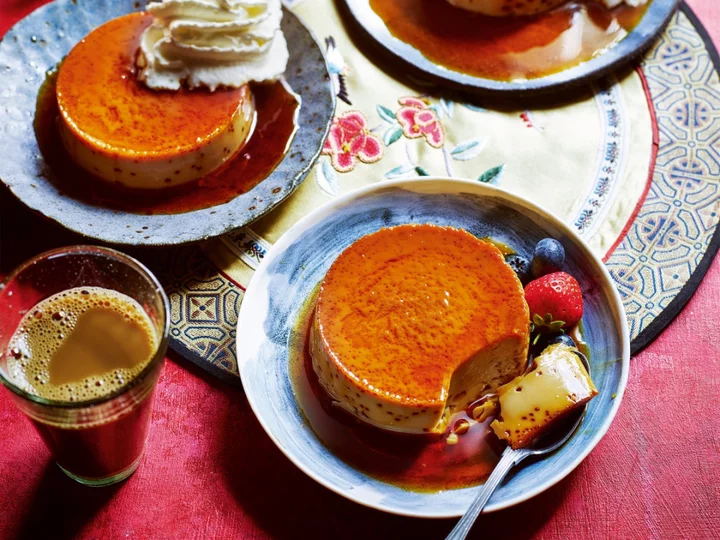
Who knew a simple flan could be so well-travelled?
Of all the sweet dishes in the world, you wouldn’t expect the simple flan to be so well-travelled,” says chef Jeremy Pang. “Yet when you look at the simplicity of its ingredients – essentially a sweetened and flavoured egg custard – you can see why so many cultures have adopted the flan into their own cuisines. “This coffee-flavoured version is found in most coffee shops in Vietnam, but it’s also one of the most popular desserts in the Philippines.” Coffee and coconut flan Makes: 10 Ingredients: For the caramel: 300g caster sugar 300ml water For the custard: 6 large eggs, at room temperature 400ml coconut milk 300ml condensed milk 1 shot of strong espresso (swapsies: 2 tbsp good-quality instant coffee dissolved in 1 tbsp hot water) Whipped cream, fresh fruit or sugared peanuts, to decorate Method: 1. Stand 10 ramekins in an ovenproof dish or a deep-sided baking tray. Preheat the oven to 160C/350F/gas mark 4. 2. For the caramel, place the sugar and water in a saucepan on a low heat and stir for three to four minutes, until the sugar fully dissolves. Increase the heat to high and allow the sugar syrup to boil vigorously, without stirring, for about five to six minutes until it reaches a rich golden brown colour, taking care to ensure it doesn’t burn. Once ready, carefully and without hesitation, divide the caramel between the ramekins to form a layer of caramel on the base of each one. 3. For the custard, crack the eggs into a large mixing bowl, add the coconut milk and condensed milk, and beat well to form a thick, smooth mixture. Add the coffee and stir in, then strain the custard through a fine mesh sieve into a jug. Divide evenly between the ramekins. 4. Pour boiling water into the ovenproof dish until level with the top of the custard in the ramekins, being careful not to get any in the flans. Bake for 45 minutes to one hour, depending on size, until set. Remove from the oven and allow to cool slightly, then remove the ramekins from the hot water, taking care not to burn yourself. Allow to cool completely before serving. 5. To serve, loosen the rim of each flan using a dampened finger and then turn out onto a serving plate. Decorate with whipped cream, fresh fruit or sugared peanuts. ‘Jeremy Pang’s School Of Wok: Simple Family Feasts’ (Hamlyn, £22). Read More Marina O’Loughlin is wrong – there’s joy in solo dining Budget Bites: Three recipes to keep food bills down before pay day Meal plan: Romesco chicken and other recipes to fall in love with The chef who hated food as a child Midweek comfort food: Singaporean curry sauce and rice How to make Thai favourite lemongrass chicken stir-fry
1970-01-01 08:00
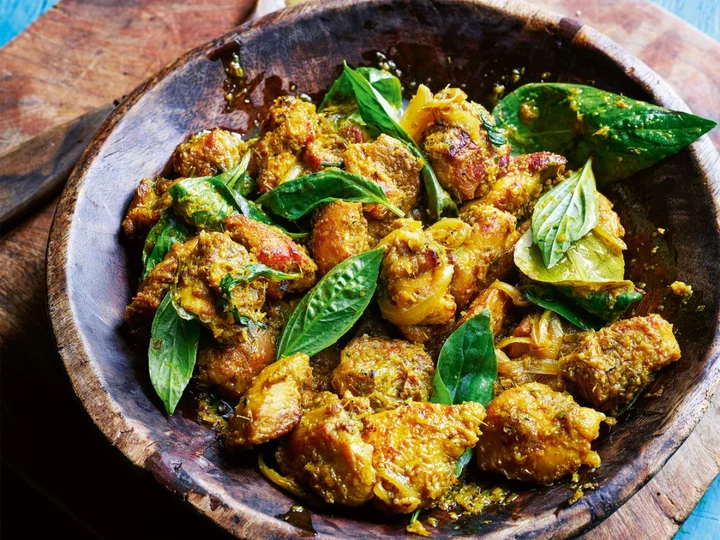
How to make Thai favourite lemongrass chicken stir-fry
I know with absolute certainty why this dish is a big-hitter on the School of Wok YouTube channel,” says chef Jeremy Pang. “Like many Thai curries and stews, it’s bold in flavour, but it can be cooked in a fraction of the time it takes for some of the slower-cooked recipes. “That means less time spent salivating over the stove and more time to eat. This fierce stir-fry will make your mouth water and your guests’ too – if you haven’t picked it all out of the wok before they arrive!” Lemongrass chicken Serves: 2 Ingredients: 4 skinless, boneless chicken thighs, cut into large chunks 1 tbsp chicken stock or water ½ white or brown onion, finely sliced 2-3 lime leaves Handful of Thai basil leaves Vegetable oil For the curry paste: 3 spring onions, finely chopped 3 garlic cloves, finely chopped 2 lemongrass stalks, trimmed, bruised and finely chopped ½ thumb-sized piece of ginger, peeled and finely chopped ½ thumb-sized piece of turmeric, peeledand finely chopped (swapsies: 1 tsp ground turmeric) 5-6 lime leaves, finely chopped ½ tsp salt For the sauce: 1 tbsp light soy sauce 1 tbsp fish sauce ½ tbsp palm sugar 50ml chicken stock Method: 1. Pound the paste ingredients together using a pestle and mortar, adding them one at a time, or blitz them in a food processor to form a smooth paste (you may need to add a tablespoon or so of water). 2. Mix the sauce ingredients together in a small bowl. 3. Place the chicken pieces in a bowl. Mix one tablespoon of the curry paste with the chicken stock or water and massage it into the chicken. 4. Build your wok clock: start at 12 o’clock with the marinated chicken, followed by the rest of the curry paste, the onion, the sauce, lime leaves and lastly the Thai basil leaves. 5. Heat one to two tablespoons of vegetable oil in a wok on a high heat until smoking hot. Add the marinated chicken and sear for a minute without moving, then fold the chicken over to sear on the other side for another minute or so. Once the chicken has a nice crisp edge and is fully browned, push it to the side of the wok. Add the curry paste to the centre of the wok, then the onion and fold the chicken over the mixture to incorporate and prevent the meat from burning. After about a minute, the onion should start to wilt. At this point, increase the heat and allow the wok to smoke before pouring the sauce around the edges of the wok. Bring to a vigorous boil, fold the chicken through and stir-fry for one to two minutes. Add the lime leaves and Thai basil leaves to finish and serve immediately. ‘Jeremy Pang’s School Of Wok: Simple Family Feasts’ (Hamlyn, £22). Read More Marina O’Loughlin is wrong – there’s joy in solo dining Budget Bites: Three recipes to keep food bills down before pay day Meal plan: Romesco chicken and other recipes to fall in love with The chef who hated food as a child Who knew a simple flan could be so well-travelled? Midweek comfort food: Singaporean curry sauce and rice
1970-01-01 08:00

Welsh farmer hunting grey squirrels to serve as burgers in pop-up restaurant
Gareth Wyn Jones, star of BBC series The Family Farm, has launched a search for a butcher who will help him hunt and prepare grey squirrels to be used in burgers. The farmer, 56, plans to serve up the invasive squirrel as part of the menu at his pop-up restaurant in the forthcoming Welsh Game Fair at the Faenol Estate, near Bangor, in September. Jones launched an appeal to help him source grey squirrels and is encouraging visitors to the fair to think of the non-native rodent as “any other wild food” when they tuck into his burgers. The pop-up will mark Jones’ first time running a restaurant. The farmer, who farms near Llanfairfechan in the foothills of the Carneddau Range, said: “Grey squirrels are not native to this country. They were introduced from America and they have led to the decline of our own red squirrel population. “Squirrel meat is like any other wild food, eating them is like foraging for anything else. We have to remember they are a pest. On the farm if I have too many rats, crows or whatever, I have to deal with them.” He added: “What’s the difference with squirrels? Their meat is a by-product so why waste it? It’s a fantastic wild food. “All I need now is an alternative butcher to supply the grey squirrels and it’ll be ready, steady, cook.” Grey squirrels from North America were introduced in the UK in the 1800s and are a major threat to native red squirrel populations. They outcompete the red squirrels for food and space, as they are prolific breeders. Grey squirrels also carry a virus called squirrelpox, which they are actually immune to, but can spread the disease to red squirrels, therefore decimating the local populations. The Woodland Trust describes the introduction of grey squirrels in the UK as having had a “disastrous impact” on red squirrels, which are the UK’s only native squirrel species. Red squirrels are a legally protected species. It is illegal to intentionally kill, injure or disturb them. Jones, who has more than a million followers across his social media channels combined, said the best way to “change things” is to eat “food that’s been produced here”, including game like grey squirrel. James Gower, chief executive of Stable Events, the organiser of the Welsh Game Fair, said: “Our aim is to celebrate everything that is best about the countryside and rural pursuits, including the wider benefits of conservation and field sports. “The pop up restaurant will provide a real showcase for the finest fare the countryside has to offer,” he added. “I can’t think of a better mine host than Gareth Wyn Jones who is passionate about promoting proper local produce – and has great likeability. “The idea of putting squirrel burgers on the menu is inspired because it means we can find a good use for a real rural pest and tantalise people’s tastebuds at the same time.” Read More Men sometimes need help – and I’m determined to start asking for it ‘Oblivious’ woman defended after walking through beach wedding: ‘They don’t own the beach’ King’s Guard shares sweet exchange with young boy wearing royal uniform
1970-01-01 08:00
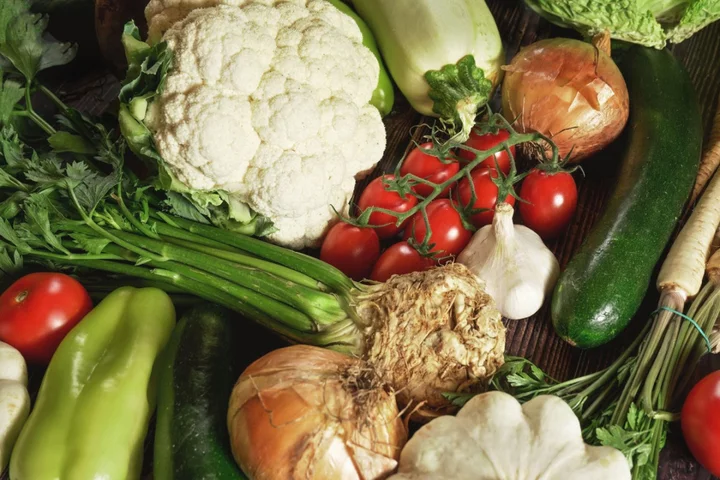
Here are eight vegetables you might not know you can eat raw for health boost
From creamy mashed potato and sweetcorn smothered in butter to rich tomato soup and miso-glazed aubergine, cooked veggies can be incredibly tasty. But did you know that, in some cases, munching raw vegetables can be better for your health? “When veggies are cooked, some of the heat-sensitive nutrients, such as vitamin C, can become depleted,” says functional nutritionist Pauline Cox, author of Hungry Woman: Eating For Good Health, Happiness And Hormones. “Beneficial enzymes within raw veg can also be lost to roasting and cooking.” Fresh veg can be especially appealing in summer when you’re craving filling salads and crunchy snacks. “Adding more raw to your daily dish will liven up your palate and upgrade your dinner plate,” Cox says. As with any raw ingredient, it’s important to prepare veg properly. “Whether you’re eating vegetables raw or cooked, always wash them well before consuming to help reduce pesticide residue or harmful bacteria,” suggests Maz Packham, nutritional therapist and founder of Nourishful Nutrition. Here, experts talk through eight vegetables that are delicious raw… 1. Sweet potato “Sweet potato, often associated with oven baked, roasted or mashed, can actually be consumed raw,” says Cox. But you’ll want to grate the flesh first to make it more palatable: “Grated into a slaw, sweet potatoes are a super source of beta carotene, vitamin C and fibre.” 2. Kale Baked kale chips have become very trendy in recent years as health-conscious individuals look for new ways to consume the vitamin-rich leaves. “Many individuals find it easier to digest kale once it’s been sauteed or steamed,” says registered nutritionist Jenna Hope. “However, massaging raw kale with olive oil instead can also help to aid digestion whilst preserving the vitamin C. “Additionally, adding olive oil can help to increase the absorption of fat-soluble vitamins such as vitamin K, which is also present in kale.” 3. Sugar snap peas Unlike some types of peas, there’s no need to shell sugar snaps, which are high in vitamins C and K. “Vitamin C is a powerhouse antioxidant we need to consume through foods for collagen production, to support iron absorption, and for a healthy functioning immune system,” says Packham. “Sugar snap peas are also a good source of vitamin K and folate which are abundant in green vegetables, and they’re a great source of fibre helping to support beneficial bacteria in the gut and good digestive health.” They make a delicious snack on their own or dipped in hummus. “You may want to break off the ends and remove the outer string that runs along the side; you may not even notice it,” Packham continues. “Cut the pods into smaller segments and mix into salads for extra texture and crunch.” 4. Celeriac “Rich in vitamin K, celeriac may have bone-health boosting properties, as higher intake of vitamin K is associated with a lower risk of fractures,” suggests Cox. Cut off the tough outer peel before grating, slicing ribbons with a vegetable peeler or chopping into small pieces. “Delicate in flavour but packed with goodness, celeriac makes a great addition to any salad,” Cox. “Thinly sliced into matchstick-sized strips and tossed with a dollop of olive oil, mayonnaise and a little mustard, celeriac can liven up any meal as a side dish.” 5. Cauliflower Cauliflower cheese may be a culinary classic, but you don’t have to bake this cruciferous veg to reap the health rewards. “Cauli is bursting with vitamin C, vitamin K and dietary fibre,” says Cox. She recommends: “Raw cauliflower makes a great dunker for a delicious guacamole or hummus.” However, if you have any digestive health issues you should be cautious with cruciferous vegetables like cauliflower. “They can cause excess gas as they contain an indigestible fibre called raffinose,” says Rob Hobson, registered consultant nutritionist at Healthspan. “Bacteria try and break this down in the large intestine and in the process produce gas. This could be an issue for people suffering from irritable bowel syndrome (IBS) as it can exacerbate symptoms.” 6. Baby corn While full-size corn cobs are way too tough to consume whole, baby corn (harvested before the stalks mature) is soft enough to munch whole. “Despite its size, baby corn is nutritionally rich containing vitamins A and C as well as folate and potassium,” says Packham. “The high fibre content helps support a healthy gut while also helping you to feel fuller for longer.” You can slice the stalks to add to salads or serve them as crudites, Packham suggests: “Baby corn is a great snack option and can be left whole – it tastes delicious dipped into hummus or guacamole.” 7. Courgette “Courgettes are rich in vitamin C and B6, which can also be degraded by high heat,” says Hope, and because it’s got a semi-firm texture it’s easy to adapt for raw dishes. Hope adds: “Try slicing up your courgettes and using them as an alternative to cucumber in salads, or sliced up and dipped into hummus or guacamole.” 8. Brussels sprouts Not a fan of the classic Christmas dinner side dish? “Trying them raw might just see you developing a newfound love for the humble Brussels sprout,” says Cox, recommending the brassica as a rich source of vitamins C and K. “Thinly sliced and treated like shredded lettuce, glug on a generous dose of avocado oil or olive oil and a few chopped pecans or walnuts and finish with some fresh, grilled goat’s cheese – this combo may well win you over!” As Brussels sprouts are cruciferous, the same warning applies to cauliflower for people with IBS. Hobson adds: “They contain compounds called glucosinolates which can reduce the absorption of iodine which could interfere with thyroid function. “People with underactive thyroid may want to limit their intake of these compounds. Cooking them lowers the levels of glucosinolates.” Read More Brain’s appetite control centre different in overweight or obese people – study Study reveals how muscle cells deteriorate with age, hampering injury recovery Is it heat exhaustion or are you just tired? Charity boss speaks out over ‘traumatic’ encounter with royal aide Ukraine war’s heaviest fight rages in east - follow live
1970-01-01 08:00

McDonald’s employee claims fast food chain’s sweet tea is made with entire bag of sugar – but others disagree
A McDonald’s employee has claimed that the fast food chain’s sweet tea is made with an entire bag of sugar. The woman named Gia, who goes by the username @gia2bad, shared a video to TikTok last month about the apparent making of McDonald’s sweet tea. In the footage, an employee appeared to be mixing the tea, as hot water was being added to it. Along with the two liquids, the employee went on to pour an entire four-pound bag of granulated sugar into the bucket. Gia also poked fun at the large amounts of sugar being used, as the text over the video read: “If y’all were wondering why the sweet tea is so sweet at McDonald’s.” She also claimed that it can take more than one bag of sugar to make the tea, writing: “Yes we use a whole bag, sometimes two.” The video went viral, with more than 1.3m views. In the comments, many people shared their shocked reactions, while poking fun at the amount of sugar filmed in the video. “Diabetes in a cup,” one quipped, while another added: “Is no one gonna talk about the bucket.” “That explains why it’s way too sweet. I always order half sweet and half unsweetened,” another wrote. Despite what was shown in the video, other people claimed that they’ve worked at McDonald’s before, and they had never seen the sweet tea made in that way. “I work there and we don’t do that…,” one wrote, while another added: “We don’t hand make sweet tea at our store it’s made with a commercial tea machine.” “We have a machine for this… I never done this when I worked at McDonald’s,” a third agreed. According to McDonald’s official website, the sweet tea is made from an “orange pekoe and pekoe cut black tea”. Some of the other ingredients in the cup include ice, and invert sugar, which “is an aqueous solution of inverted or partly inverted, refined or partly refined sucrose,” according to the Food and Drug Administration. McDonald’s also notes that in a large cup of the sweet tea, there are 40 grams of sugar. According to the FDA, its Dietary Guidelines for Americans “recommends limiting calories from added sugars to less than 10 percent of total calories per day”. For example, if you eat 2,000 calories a day, you’d only have “50 grams of added sugars per day”. @gia2bad Yes we use a whole bag sometimess 2 ?♀️?♀️ #fyp ♬ original sound - DJ Veinz The Independent has contacted Gia and a representative for McDonald’s for comment. Gia isn’t the first McDonald’s employee to make claims about how the chain’s sweet tea is allegedly made. In a viral TikTok video made by former McDonald’s worker, Nicole, she also claimed that there was a lot of sugar used to make the tea. “For every four gallons of the red jug, the sweet tea, there was a full four-pound bag of sugar emptied into it,” the woman, who said she was a manager at McDonald’s, explained in the since-deleted video, which has been shared on YouTube. “One pound per gallon of tea. I stopped drinking the tea after I realised that. Because that’s nasty.” Read More McDonald’s to investigate allegations worker was taunted over rape Mark Zuckerberg reveals his 4,000 calorie diet and large McDonald’s order Coca-Cola, McDonald’s and PepsiCo named as worst packaging polluters in UK Mark Zuckerberg reveals his 4,000 calorie diet and large McDonald’s order Budget Bites: Three recipes to keep food bills down before pay day I was an air fryer sceptic – now I can’t stop using it
1970-01-01 08:00
